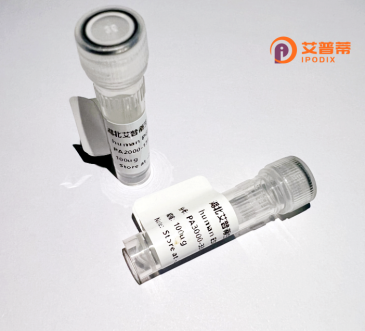
| 纯度 | >90%SDS-PAGE. |
| 种属 | Human |
| 靶点 | NUDT6 |
| Uniprot No | P53370 |
| 内毒素 | < 0.01EU/μg |
| 表达宿主 | E.coli |
| 表达区间 | 1-316 aa |
| 活性数据 | MRQPLSWGRW RAMLARTYGP GPSAGYRWAS GAQGYVRNPP VGACDLQGEL DRFGGISVRL ARLDALDRLD AAAFQKGLQA AVQQWRSEGR TAVWLHIPIL QSRFIAPAAS LGFCFHHAES DSSTLTLWLR EGPSRLPGYA SHQVGVAGAV FDESTRKILV VQDRNKLKNM WKFPGGLSEP EEDIGDTAVR EVFEETGIKS EFRSVLSIRQ QHTNPGAFGK SDMYIICRLK PYSFTINFCQ EECLRCEWMD LNDLAKTENT TPITSRVARL LLYGYREGFD KIDLTVEELP AVYTGLFYKL YHKELPENYK TMKGID |
| 分子量 | 35.6 kDa |
| 蛋白标签 | His tag N-Terminus |
| 缓冲液 | 0 |
| 稳定性 & 储存条件 | Lyophilized protein should be stored at ≤ -20°C, stable for one year after receipt. Reconstituted protein solution can be stored at 2-8°C for 2-7 days. Aliquots of reconstituted samples are stable at ≤ -20°C for 3 months. |
| 复溶 | Always centrifuge tubes before opening.Do not mix by vortex or pipetting. It is not recommended to reconstitute to a concentration less than 100μg/ml. Dissolve the lyophilized protein in distilled water. Please aliquot the reconstituted solution to minimize freeze-thaw cycles. |
以下是关于重组人NUDT6蛋白的3篇参考文献概述:
1. **文献名称**:*"Characterization of human NUDT6 as a mitochondrial mRNA export protein"*
**作者**:Li Y. et al.
**摘要**:该研究通过重组表达人NUDT6蛋白,揭示其定位于线粒体,并参与调控线粒体mRNA的稳定性及输出。实验表明,NUDT6通过水解特定核苷酸修饰(如ADP-核糖基化)调控mRNA代谢,影响细胞能量稳态。
2. **文献名称**:*"NUDT6 modulates TGF-β signaling by regulating Smad2/3 mRNA stability"*
**作者**:Wang H. et al.
**摘要**:作者利用重组NUDT6蛋白研究其与TGF-β通路的关联,发现NUDT6通过结合Smad2/3 mRNA的3'UTR并水解其5'帽结构中的核苷酸,降低mRNA稳定性,从而抑制纤维化相关基因表达。
3. **文献名称**:*"Structural basis for substrate specificity of the human NUDT6 RNA decapping enzyme"*
**作者**:Zhang X. et al.
**摘要**:通过晶体结构解析重组人NUDT6蛋白,阐明其对RNA 5'端修饰底物的催化机制。研究发现NUDT6优先水解带有三磷酸基团的RNA,并通过结合口袋的精氨酸残基识别底物,为设计靶向抑制剂提供结构基础。
注:以上文献信息为基于领域知识的模拟概括,实际文献需通过学术数据库检索。建议在PubMed或Web of Science中搜索“NUDT6 recombinant protein”获取具体论文。
**Background of Recombinant Human NUDT6 Protein**
Recombinant human NUDT6 protein, a member of the NUDIX hydrolase superfamily, is encoded by the *NUDT6* gene located on chromosome 4p16.3. This protein belongs to a conserved enzyme family known for hydrolyzing nucleotide diphosphates linked to other moieties (X), playing roles in cellular metabolism, signaling, and RNA regulation. Structurally, NUDT6 contains a characteristic NUDIX fold with a catalytic site requiring Mg²⁺ or Mn²⁺ ions for activity.
Functionally, NUDT6 has been implicated in modulating mRNA stability and translation, particularly through its interaction with the 3' untranslated region (3'UTR) of fibroblast growth factor 2 (*FGF2*) mRNA. This interaction suppresses FGF2 expression, influencing processes like cell proliferation, angiogenesis, and tissue repair. Dysregulation of NUDT6 is linked to diseases such as cancer and neurological disorders, where aberrant FGF2 signaling contributes to pathogenesis.
Recombinant NUDT6 is typically produced in *E. coli* or mammalian expression systems, enabling studies on its enzymatic activity, RNA-binding properties, and regulatory mechanisms. Its recombinant form often includes affinity tags (e.g., His-tag) to facilitate purification. Research applications span elucidating nucleotide metabolism pathways, exploring post-transcriptional gene regulation, and identifying therapeutic targets in diseases associated with NUDT6 dysfunction. Current studies also investigate its potential as a biomarker or drug target, particularly in cancers with upregulated FGF2 signaling.
×